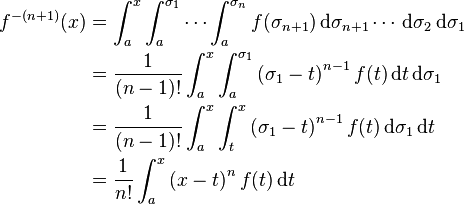Cauchy formula for repeated integration
The Cauchy formula for repeated integration, named after Augustin Louis Cauchy, allows one to compress n antidifferentiations of a function into a single integral (cf. Cauchy's formula).
Scalar case
Let ƒ be a continuous function on the real line. Then the nth repeated integral of ƒ based at a,
 ,
,
is given by single integration
 .
.
A proof is given by induction. Since ƒ is continuous, the base case follows from the Fundamental theorem of calculus:
 ;
;
where
 .
.
Now, suppose this is true for n, and let us prove it for n+1. Apply the induction hypothesis and switching the order of integration,
The proof follows.
Applications
In fractional calculus, this formula can be used to construct a notion of differintegral, allowing one to differentiate or integrate a fractional number of times. Integrating a fractional number of times with this formula is straightforward; one can use fractional n by interpreting (n-1)! as Γ(n) (see Gamma function).
References
- Gerald B. Folland, Advanced Calculus, p. 193, Prentice Hall (2002). ISBN 0-13-065265-2
External links
- Alan Beardon (2000). "Fractional calculus II". University of Cambridge.
